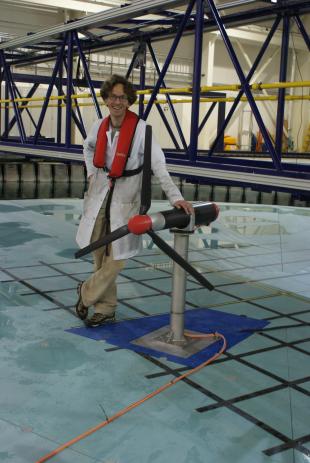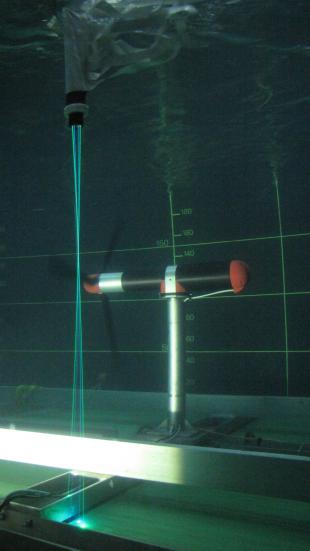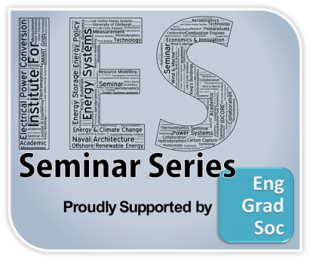Location:
Hudson Beare, Classroom 4
Date:
First Speaker: Dr Gregory Payne
Title: Experimental considerations and testing for extreme loads on tidal turbines
Abstract:
Extreme loading and associated survivability are key aspects of tidal turbines. Within the EPSRC funded Xmed project, extreme loads due to combine wave and current hydrodynamic loading are investigated. Impact loads arising from collision with large sea animal are also considered.
This seminar presents in details the design process of the turbine model which includes some preliminary impact test. The turbine has been commissioned at FloWave and tested last month at the current and wave flume of IFREMER in the North of France. The commissioning of the turbine model at FloWave, its testing last month at the current and wave flume of IFREMER in the North of France and preliminary results will also be presented.
The tidal device considered is a generic three bladed horizontal axis turbine. The scale of the model is approximately 1/15. The rotor is designed so that the thrust and power coefficient curves as a function of tip speed ratio are similar to those of a full-scale prototype. Blade design was carried out by combining an in-house blade element momentum code with a finite element analysis. Impact loads were estimated using a separate experimental apparatus consisting of a rotating arm with similar inertia to that of the rotor which hits a target with similar mechanical properties to those of a marine animal.
Bio:
Gregory Payne is a research engineer with more than 15 years’ marine renewable experience gained within academic and commercial sectors. He did his PhD with Stephen Salter on the numerical modelling and tank testing of slope IPS buoy wave energy converter concept. He then worked for Artemis Intelligent Power on the development of a high efficiency hydraulic motor for power conversion for marine energy converters (tidal and waves) in collaboration with Pelamis. As part of his work as a research fellow for the University of Edinburgh, he has developed an innovative optical sensor to measure water elevation. He has also worked as a resource analyst for Aquamarine Power Ltd. Over the last three years, he has focused on tidal energy, working first as metoecan consultant for MCT and then working at the University of Edinburgh on designing long deployment solutions for acoustic current meters in high velocity tidal sites for the PerAWaT project. He is currently working on the experimental investigation of extreme loads on tidal turbine as part of the Xmed project.
Second Speaker: FloWave
Title: Testing possibilities with FloWave
Abstract:
In this talk, a representative from FloWave will provide a short presentation about the potential for academic work to be tested in the FloWave tank. The aim is to supply students and academics with information on how to approach FloWave and use one of the great resources we have at the University of Edinburgh. A generalised overview of the testing process will be explained and examples of guidance FloWave can offer will be detailed. The application procedure of a project will be outlined, however for further information on booking time with FloWave you are advised to contact Professor Markus Mueller and for generalised application procedure, please see below:
PROCEDURE:
Note: any publications from the testing should include the assisting staff member at FloWave as a co-author.
Bio:
Conceived for cutting edge academic research into wave and tidal current interactions, the FloWave Ocean Energy Research Facility is also an amazing tool for commercial developers to ensure their technologies and projects perform ‘right first time’ and are de-risked as much as practical before cutting steel or going offshore.
For new device developers FloWave represents a great asset for de-risking and refining performance of new designs at model scale before cutting steel on a first prototype. For more established device developers – meaning those with prototypes already in the water on test at EMEC and elsewhere – FloWave is an opportunity to run model-scale tests on revised designs that incorporate the ‘lessons-learned’ from actually having a device in the water.
Finally, for demonstrator project and commercial array developers FloWave presents a world-unique opportunity to validate CFD layout, micro-siting and energy yield predictions with physical modelling – before investing tens of millions in the project itself.
Further Information
- Discuss the project with your PhD supervisor/Line manager and partly complete the form.
- Arrange a meeting with Tom Davey or Jeff Steynor at FloWave to discuss the project.
- Modify form based on discussions with FloWave.
- Final approval from HoRI and FloWave Ltd.
Event Contact Name:
Joseph Burchell





